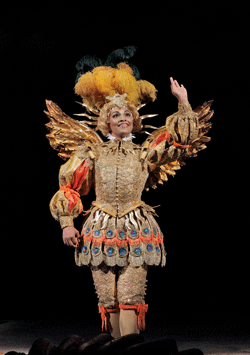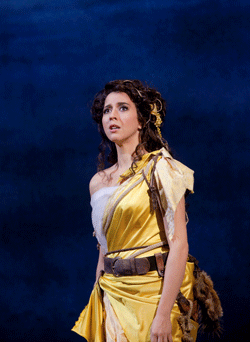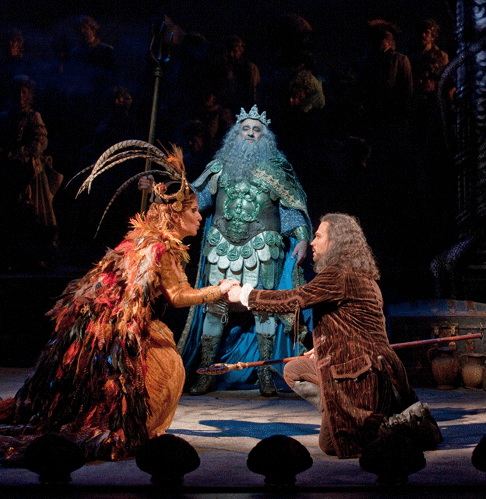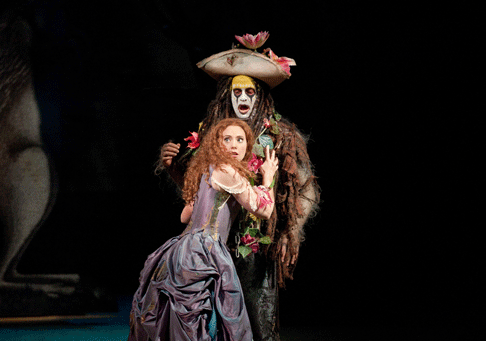![David Daniels as Prospero [Photo by Ken Howard courtesy of The Metropolitan Opera]](http://www.operatoday.com/ENCHANTED-ISLAND-Daniels-34.gif)
25 Jan 2012
The Enchanted Island, Metropolitan Opera
This year is a big year for the Met. Of the seven new productions on the roster, two are the last two installments of a much-anticipated Robert Lepage Ring.
English Touring Opera are delighted to announce a season of lyric monodramas to tour nationally from October to December. The season features music for solo singer and piano by Argento, Britten, Tippett and Shostakovich with a bold and inventive approach to making opera during social distancing.
This tenth of ten Live from London concerts was in fact a recorded live performance from California. It was no less enjoyable for that, and it was also uplifting to learn that this wasn’t in fact the ‘last’ LfL event that we will be able to enjoy, courtesy of VOCES8 and their fellow vocal ensembles (more below …).
Ever since Wigmore Hall announced their superb series of autumn concerts, all streamed live and available free of charge, I’d been looking forward to this song recital by Ian Bostridge and Imogen Cooper.
Although Stile Antico’s programme article for their Live from London recital introduced their selection from the many treasures of the English Renaissance in the context of the theological debates and upheavals of the Tudor and Elizabethan years, their performance was more evocative of private chamber music than of public liturgy.
Evidently, face masks don’t stifle appreciative “Bravo!”s. And, reducing audience numbers doesn’t lower the volume of such acclamations. For, the audience at Wigmore Hall gave soprano Elizabeth Llewellyn and pianist Simon Lepper a greatly deserved warm reception and hearty response following this lunchtime recital of late-Romantic song.
For this week’s Live from London vocal recital we moved from the home of VOCES8, St Anne and St Agnes in the City of London, to Kings Place, where The Sixteen - who have been associate artists at the venue for some time - presented a programme of music and words bound together by the theme of ‘reflection’.
'Such is your divine Disposation that both you excellently understand, and royally entertaine the Exercise of Musicke.’
‘And there was war in heaven: Michael and his angels fought against the dragon; and the dragon fought and his angels, And prevailed not; neither was their place found any more in heaven … that old serpent … Satan, which deceiveth the whole world: he was cast out into the earth, and his angels were cast out with him.’
There was never any doubt that the fifth of the twelve Met Stars Live in Concert broadcasts was going to be a palpably intense and vivid event, as well as a musically stunning and theatrically enervating experience.
‘Love’ was the theme for this Live from London performance by Apollo5. Given the complexity and diversity of that human emotion, and Apollo5’s reputation for versatility and diverse repertoire, ranging from Renaissance choral music to jazz, from contemporary classical works to popular song, it was no surprise that their programme spanned 500 years and several musical styles.
The Academy of St Martin in the Fields have titled their autumn series of eight concerts - which are taking place at 5pm and 7.30pm on two Saturdays each month at their home venue in Trafalgar Square, and being filmed for streaming the following Thursday - ‘re:connect’.
The London Symphony Orchestra opened their Autumn 2020 season with a homage to Oliver Knussen, who died at the age of 66 in July 2018. The programme traced a national musical lineage through the twentieth century, from Britten to Knussen, on to Mark-Anthony Turnage, and entwining the LSO and Rattle too.
With the Live from London digital vocal festival entering the second half of the series, the festival’s host, VOCES8, returned to their home at St Annes and St Agnes in the City of London to present a sequence of ‘Choral Dances’ - vocal music inspired by dance, embracing diverse genres from the Renaissance madrigal to swing jazz.
Just a few unison string wriggles from the opening of Mozart’s overture to Le nozze di Figaro are enough to make any opera-lover perch on the edge of their seat, in excited anticipation of the drama in music to come, so there could be no other curtain-raiser for this Gala Concert at the Royal Opera House, the latest instalment from ‘their House’ to ‘our houses’.
"Before the ending of the day, creator of all things, we pray that, with your accustomed mercy, you may watch over us."
The doors at The Metropolitan Opera will not open to live audiences until 2021 at the earliest, and the likelihood of normal operatic life resuming in cities around the world looks but a distant dream at present. But, while we may not be invited from our homes into the opera house for some time yet, with its free daily screenings of past productions and its pay-per-view Met Stars Live in Concert series, the Met continues to bring opera into our homes.
Music-making at this year’s Grange Festival Opera may have fallen silent in June and July, but the country house and extensive grounds of The Grange provided an ideal setting for a weekend of twelve specially conceived ‘promenade’ performances encompassing music and dance.
There’s a “slide of harmony” and “all the bones leave your body at that moment and you collapse to the floor, it’s so extraordinary.”
“Music for a while, shall all your cares beguile.”
The hum of bees rising from myriad scented blooms; gentle strains of birdsong; the cheerful chatter of picnickers beside a still lake; decorous thwacks of leather on willow; song and music floating through the warm evening air.
![David Daniels as Prospero [Photo by Ken Howard courtesy of The Metropolitan Opera]](http://www.operatoday.com/ENCHANTED-ISLAND-Daniels-34.gif)
This year is a big year for the Met. Of the seven new productions on the roster, two are the last two installments of a much-anticipated Robert Lepage Ring.
Another, Anna Bolena, was more than simply a new production to mark opening night. It was also a new addition to the company’s repertoire. Still another, The Enchanted Island, was a world premiere. In this final instance, the composer who was lucky enough to land such a high profile engagement was none other than…George Frideric Handel?
 Danielle de Niese as Ariel
Danielle de Niese as Ariel
If this seems perplexing, don’t worry, it is. What’s even more confusing is, he is not the only composer to create this new work. The others, Antonio Vivaldi and Jean-Philippe Rameau, are just as old. The question then becomes: how can an opera be new if it utilizes music that is over two hundred years old? The answer is not as difficult as it would appear. The Enchanted Island, the brainchild of famed conductor and Baroque interpreter William Christie, with an English language libretto by Jeremy Sams, is meant to be a modern take on a Baroque genre known as pasticcio, in which multiple arias from one or more composers would be combined with occasional changes in text to create an entirely new plotline.
The idea of a modern pasticcio fits well into the scheme of the modern Baroque revival, which began in the latter half of the 20th century. However, despite the similarities between Baroque and Bel Canto opera, which was revived around World War II, Baroque works pose a greater challenge to modern audiences.
 Lisette Oropesa as Miranda
Lisette Oropesa as Miranda
This is because all aspects of Baroque opera performance practice are closely tied to the promotion of the absolutist regimes of the 17th century. In our modern era, when audiences are so far removed from these institutions, the challenge becomes making these works speak to people with the same immediacy they did centuries ago.
In this light, this opera, which combines elements of The Tempest and A Midsummer Night’s Dream into a comedy of errors and mistaken affections, was a rousing success. The work manages to flawlessly combine the diverse aspects of Baroque opera, such as the da capo aria, the use of ballet, innovative stage craft, as well as the distinction between recitative, arioso and aria seamlessly. Its principal roles, sung by such lauded Baroque interpreters as countertenor David Daniels (Prospero), soprano Danielle De Niese (Ariel), and mezzo soprano Joyce DiDonato (Sycorax), made an excellent case for the emotive power of Baroque music, especially its ornamentation, while at the same time updating the somewhat stilted figures of tragic nobility which populate Opera Seria.
In contrast to a work like Handel’s Giulio Cesare, in which the just nobles, Cesare and Cleopatra, are pitted against the wicked nobles, here symbolized by Ptolemeo, the nobility of The Enchanted Island was neither totally sympathetic nor totally antipathetic. Instead, each aria focused on the humanity of the emotions each character was feeling. In this light, Joyce DiDonato stole the show. Her opening aria, “Maybe Soon, Maybe Now,” showcased her ability to draw the emotive colors of Baroque ornamentation, which included growls.
 Joyce DiDonato as Sycorax, Placido Domingo as Neptune, and David Daniels as Prospero
Joyce DiDonato as Sycorax, Placido Domingo as Neptune, and David Daniels as Prospero
There were times when Danielle de Niese used her coloratura to explosive effect. In much the same way, David Daniels showed how improvised vocal technique could be used for emotional display. His legato showed vulnerability while his ornaments illustrated a fierce display of anger. Other standouts include Layla Claire as Helena and Elizabeth DeShong as Hermia; their voices blended excellently in their duet where they complain of their lovers’ rejection. Lisette Oropesa was a rather vulnerable Miranda. She gave an excellent turn in her arioso. Luca Pisaroni was comical yet sympathetic as Caliban. His role as Caliban allowed him to express the depth he is capable of. Countertenor Anthony Roth Costanzo was brilliant in the brief but crucial role of Ferdinand. Lastly, Placido Domingo, singing on his 71st birthday, was thrilling as Neptune. It is good to see that despite his age, his skill as a consummate performer has not diminished. However, his diction suffered at the expense of the fast runs of his music. In the end, that did not reduce the overall effect of his performance.
The production, directed by Phelim McDermott, combined elements of ancient Baroque productions with modern technology. The audience was able to see the full extent of the Metropolitan Opera’s resources, both in costuming as well as in technology. This allows modern audiences to experience the opera as someone would have back in Baroque times.
 Layla Claire as Helena and Luca Pisaroni as Caliban
Layla Claire as Helena and Luca Pisaroni as Caliban
I have only two criticisms. On occasion, the music didn’t fit the text. Naturally, this genre of opera is predicated on the da capo aria, with its contrasting A and B sections as symbolic of the Aristotelian view of rhetoric that was popular at the time. However, most often, in the music of Sycorax, as well as the early music of Ariel, the text seemed to depict the opposite of what the music was communicating. In the case of Sycorax, her text would be asking for pity when the music was bloodthirsty for revenge. Also, the opera is long, especially the first act. Prospero’s aria, which closes Act I, in which he expresses dismay at all the confusion he has caused, could just as easily have been moved to the beginning of Act II. This would have allowed Act I to end with the fanfare at the end of Neptune’s scene: a much stronger point for a finale.
When everything is taken into consideration, The Enchanted Island is indeed a new opera. Despite the fact that none of the music is original, it successfully recasts all the facets of the genre in a new light, which concentrates less on politics and more on artistic expression. If the multitude of young children at the performance was any indication, this opera met its goals with great success. As long as it can draw new audiences and demonstrate the staying power of its music, the Baroque revival is on track.
Greg Moomjy